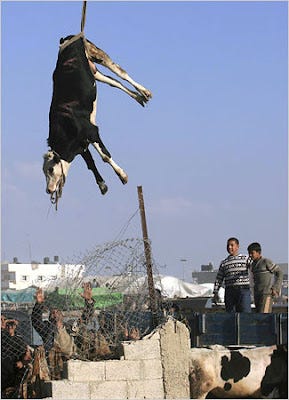Opening Rafah is Crucial to Peace
You can learn so much from a border. It is the dividing line between two independent political entities. With the exception of the Great Wall of China, an ancient border wall, borders are never visible from space. On the ground they can be outright daunting. Imposing structures, passport control, guard towers, and uniformed men with guns are some of the eye candy one typically finds at border crossings. Hang out at a border for a couple hours and you can quickly learn which country is richer, stronger, and safer. Open borders give the feeling of friendship and trust. Closed borders are breeding grounds of paranoia and distrust. Healthy borders are places of order, where people and goods are processed systematically.
The Rafah border crossing this week was not a place of order, but reminded me of an ant farm when you throw some sugar into it. Suddenly the ants break down a wall and then its a free-for-all to get to the sugar. In this case, Hamas broke down the wall and Egyptian merchants provided the sugar. Commodity providers in the economically stagnant Sinai peninsula suddenly saw their sales figures skyrocket, Palestinians were able to get some basic commodities, and Israel was relieved of the guilt of imprisoning, starving, and freezing nearly two million Palestinians. Which makes me wonder, why can’t everyone just thank Hamas and keep this border open?
Watching these chaotic scenes, I was reminded of a couple anecdotes from Israel’s Disengagement from Gaza in 2005. Remember the 100 million dollar a year agricultural industry in the Jewish Gazan settlement block of Gush Katif? It was purchased by a group of wealthy Jewish businessman, among them James Wolfensohn, and then donated to the Palestinians. Hundreds of greenhouses that could have produced thousands of kilograms of organic vegetables a year, feeding generations of Palestinians, were instead burnt to the ground. Having been to sub-Saharan Africa a number of times, watching people burn food brought tears to my eyes. It also crystallized the cockamamie logic of extremism in my mind. The moderate dream of a Palestinian state living in peace next to Israel was being sabotaged from within by extremist groups who prefer chaos and dependency to order and independence. The same extremists that enabled the Palestinians to eat this week were the ones who destroyed their farms two and a half years ago.
I also remember just two months after Israel’s Disengagement from Gaza, in November 2005, Mahmoud Abbas and his PA dignitaries came to cut a red ribbon at the official opening of the border. Rafah instantly became a symbolic place for the future Palestinian state as the first international border ever to be controlled by a Palestinian Arab government. There was a lot of hand shaking, smiling, and fraternizing with journalists. Palestinian border police wore sparkling new uniforms and tested out the ink on their newly-minted stamps. Shiny new video cameras and television monitors were installed. 70 border monitors from the European Union were there just to make sure things went smoothly. Who would have thought that in less than 1000 days, Fatah would be powerless in Gaza, the fence would be destroyed, Egyptian riot police would be trading bullets with Hamas, and cows would be hoisted over the border on a crane?

If any man could have predicted this, it is Ariel Sharon. The military mastermind, the builder and destroyer of the Gaza settlements, and the Israeli who knows Arab Gaza best, still lies comatose in a hospital bed, getting food pumped in and out of his lifeless body. Could the opening of this border be the final phase of Sharon’s Disengagement Plan? I believe Sharon knew that by disengaging unilaterally, effectively isolating and ignoring Mahmoud Abbas, Gaza would eventually fall into the hands of Hamas. Sharon probably also anticipated the Palestinian power struggle, as we’ve seen. And he probably anticipated the emergence of a unified, democratic voice, as we’ve seen in Gaza. These should all be seen as positive developments in the eyes of Israel because it will provide real negotiating partners. Now it is only a question of Hamas softening its stance and recognizing Israel’s right to exist.
I believe that Hamas will one day sit at the negotiating table with Israel, but by keeping Gaza hermetically sealed, Israel and Egypt only strengthen Hamas’ radical positions and thus prevent Hamas’ nutty theories from being challenged by the world of ideas. From Israel’s perspective, opening Rafah is the only viable option. They could pass on the burden of feeding and fueling the Palestinians to Egypt. They would not be seen as the big, bad warden of Gaza anymore. That burden would then become Egypt’s, which is why they are so against the opening of Rafah. From Israel’s security perspective, there is already a sprawling network of underground tunnels below the ground in Rafah bringing in drugs and weapons and terrorists into Gaza that Israel has no power over. Before Israel entertains this idea, it would first have to better secure the border between Egypt’s Sinai and the Israeli Western Negev, the state’s longest international border. Israel would also have to give up a lot of money it gets from the no-bid contracts to provide Gaza with power. Its deterrence will be greater for it will leave military options as the only leverage in punishing Gaza for Qassam rocket attacks. Once Egypt gets over the fear of 2 million Palestinian refugees flooding into the country, these refugees could also bring financial opportunity. As they’ve seen this week, Egyptian traders in the Sinai can benefit. Egyptian contractors can provide fuel, gas, and electricity to Gaza. Internationally donated food can come in through Rafah instead of through Israel, providing jobs in transport. The Sinai economy, which relies mostly on tourism, could diversify. Most importantly, for the Palestinians of Gaza, permanently opening Rafah would be a breath of fresh air and a reason not to strap on suicide belts.

